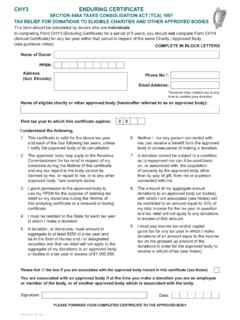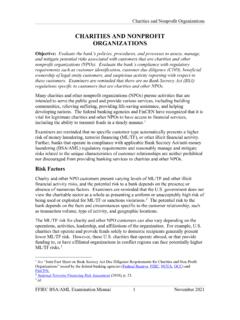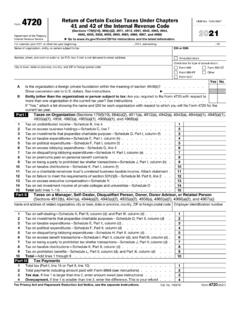Transcription of Charity sector guidance - GOV.UK
1 1 charities and NGOs This document covers questions relevant to charities and non-governmental organisations (NGOs), especially those operating in areas where financial sanctions are in force. It should be read alongside OFSI s Financial Sanctions guidance . Helpful sources of information are listed at the end of this document. Office of Financial Sanctions Implementation This guidance is produced by the Office of Financial Sanctions Implementation (OFSI), part of HM Treasury, the authority for the implementation of financial sanctions in the United Kingdom (UK). It provides financial sanctions guidance for entities and individuals which operate in, or with, the Charity or NGO sector , especially those who are involved in work that may include activity with those subject to UK financial sanctions. This should be considered supplementary to, and not a replacement for, OFSI s general guidance document. Further sources of information including contact details which may prove helpful and are mentioned within this document are listed in Annex II.
2 This guidance does not represent legal advice. If you are unsure about your obligations in a given case, you should consider seeking independent legal advice. Charity sector guidance Financial Sanctions guidance for charities and other non-governmental organisations (NGOs) 2 What are sanctions? Sanctions help the UK meet its foreign policy and national security aims, while maintaining confidence in its business sectors. Sanctions regimes are imposed for a variety of reasons such as proliferation of nuclear weapons, terrorist activity, and violation of human rights. Effective implementation and enforcement of sanctions is essential in helping to stop these actions. Sanctions are used to: coerce designated persons into changing their behaviour deny them access to resources they need to continue their offending behaviour signal disapproval, stigmatise and potentially isolate and send broader political messages to domestic and international audiences Sanctions are imposed by the United Nations, European Union, UK and other countries, such as the United States, Canada and Japan.
3 They include arms embargoes, trade sanctions, immigration sanctions and financial sanctions. Financial sanctions: charities and NGOs charities and NGOs must comply with financial sanctions. It is a criminal offence to breach financial sanctions. This applies to all charities and NGOs, including individual members of staff, regardless of whether they are government-funded. However, charities and NGOs can: rely on exceptions in the law which permit certain activities or apply for a licence to work with or through a sanctioned individual or organisation For more information, please review the licensing section of this guidance , and OFSI s Financial Sanctions guidance . Dealing with a designated person An individual or entity who is the subject of sanctions is referred to as a Designated Person (DP). If you think you are dealing with a DP, review the information you have about the individual or organisation, checking OFSI s consolidated list of those subject to financial sanctions on its pages of the website: financial-sanctions-consolidated-list-of -targets If you are unsure and there is no risk to yourself or others connected to your Charity /NGO in doing so, consider asking them for more information.
4 You should also consider if they are owned or controlled by individuals or organisations subject to financial sanctions, either directly or indirectly. OFSI s Financial Sanctions General guidance also includes more information on ownership and control . However, if you are still unsure, contact OFSI immediately using the details in Annex II of this document. If you establish that you are dealing with a sanctioned individual or organisation, take three steps: 1. Contact OFSI immediately 2. Freeze their funds and economic resources in your possession 3. Do not make funds or economic resources available to them. The OFSI General guidance contains more detailed information. We have also included a glossary of terms (see Annex I) which defines economic resources . It is against the law to receive money, goods or economic resources from, or send these to an individual or organisation subject to financial sanctions, unless you have a licence from OFSI or can rely on an exception in the legislation 3 More information about licences is available later in this document.
5 Financial sanctions imposed by other countries As a member of the UN Security Council, the UK imposes all financial sanctions created by this body as well as some of its own financial sanctions. Financial sanctions imposed by other governments may also impact your ability to operate where: your operations are within their jurisdiction goods originate from that country (if exporting goods) you are dealing in their currency. If you operate in (or through) another country, check: what financial sanctions are in place in that country if you need a licence with the relevant licensing body For example, if you plan to transact in US dollars or work with US persons or companies, check that you comply with US sanctions. You can liaise with the US sanctions administrator, the Office of Foreign Assets Control (OFAC), for more information. You may need a licence from OFAC as well as from OFSI. Due diligence Each organisation should assess its own exposure and put due diligence measures in place to manage any identified or anticipated risks of breaching financial sanctions.
6 OFSI does not mandate specific measures to be taken. OFSI can provide guidance as to what measures may be helpful (set out below), but the responsibility remains with the Charity or NGO to ensure that it has put in place sufficient measures to ensure it does not breach financial sanctions. The following is general guidance regarding due diligence measures which NGOs and charities may wish to consider: Make yourself aware of financial sanctions imposed by the UK, and UN and who they impact. OFSI publishes an up-to-date, online list of those subject to financial sanctions in the UK: /financial-sanctions-regime-specific- consolidated-lists-and-releases assess all aspects of your proposed project, including payment and supply chains, to identify if any partners, contractors or financial institutions appear on the above sanctions list, or are owned or controlled by any listed persons tailor your compliance approach to the likelihood of you dealing with these individuals and organisations, directly or indirectly consider and take steps to mitigate against financial crime risks such as: terrorist financing, corruption or laundering the proceeds of crime they all form part of a comprehensive compliance approach If you do the above, it may help you later your bank may require information on your compliance approach before processing payments as it needs to ensure compliance with financial crime laws applicable to both you and itself.
7 Where there are risks, such as a project based in a high-risk location, conduct thorough checks of who you are dealing with, checking all points in the payment chain and those involved in your project on the ground. If you think you may be conducting business or anticipate conducting business with individuals or organisations subject to financial sanctions: contact OFSI immediately consider if you should apply for a licence from OFSI 4 Breaching Financial sanctions Breaching financial sanctions is a criminal offence with enforcement powers having been expanded in the Policing and Crime Act (2017), making breaches of financial sanctions a serious offence in line with bribery, corruption and other serious financial crimes. Contravention of the legislation is punishable by a custodial sentence of up to 7 years or a civil monetary penalty fine, the latter imposed by OFSI. Law enforcement may also consider Deferred Prosecution Agreements or Serious Crime Prevention Orders, depending on the case.
8 More information on enforcement for breaches of financial sanctions can be found in OFSI s general guidance and monetary penalty guidance available on and also by referring to the relevant legislation of the country sanctions regime in place. If you suspect you may have breached financial sanctions, contact OFSI immediately, even if you are unsure and want to make further checks. It is in your interest to declare a breach or potential breach as early as possible to reduce your regulatory risk, action being taken against you. There is more information on OFSI s enforcement approach later on in this guidance . Charity Commission guidance The Charity Commission for England and Wales (the Commission) advises you to report any breach in line with its Serious Incident Report Framework online via its website. The Commission publishes guidance on reporting Serious Incidents , including how to report: a-serious-incident-in-your- Charity Finally, you have a duty to report certain terrorist financing offences to a constable under Section 19 of the Terrorism Act 2000 (TACT).
9 For the purposes of section 19 (7B) of TACT a constable is also defined as a National Crime Agency officer. Information about this is also published by the Commission: m-act-alert-30-september-2015 Licensing If a certain activity is prohibited under a financial sanctions regime, and there is no relevant exception in the law which permits it, you need to apply for a licence. Activity is not necessarily permitted just because it is for a charitable or humanitarian purpose. An OFSI licence allows financial activity with individuals or organisations, subject to financial sanctions, which would normally be prohibited. Licences can only be granted where there are specific and relevant licensing grounds. There is often but not always a licensing ground that specifically relates to humanitarian activities. This will be set out in the relevant piece of legislation. It is important to be aware of the relevant licensing grounds which vary for each regime and can include constraints.
10 There are also usually attached reporting requirements. Applicable licensing grounds are covered in the regulations for each financial sanctions regime. Information about what financial sanctions are in place for each regime is available on OFSI s pages on : nancial-sanctions-regime-specific- consolidated-lists-and-releases Applying for a licence The Charity or NGO as opposed to the grant- maker or donor that is dealing with the individual or organisation subject to financial sanctions applies for the licence. The humanitarian licence is the most common licence issued to charities and NGOs, but you should review the full list of licences before applying. This list can be found in OFSI s Financial Sanctions guidance . 5 An application cannot be made retrospectively. Undertaking prohibited activity without a licence is an offence and will lead to enforcement action being taken, which could include but is not limited to a warning, a civil monetary penalty or criminal prosecution.

















